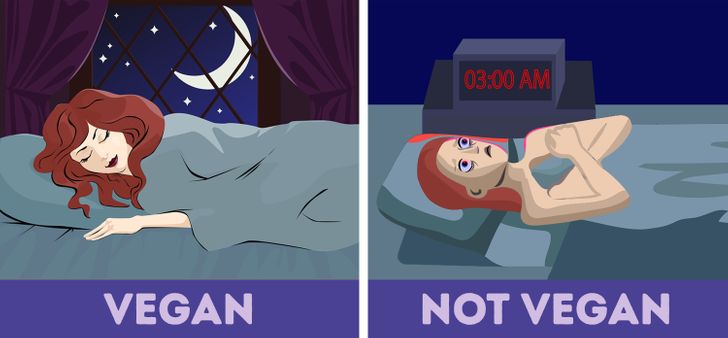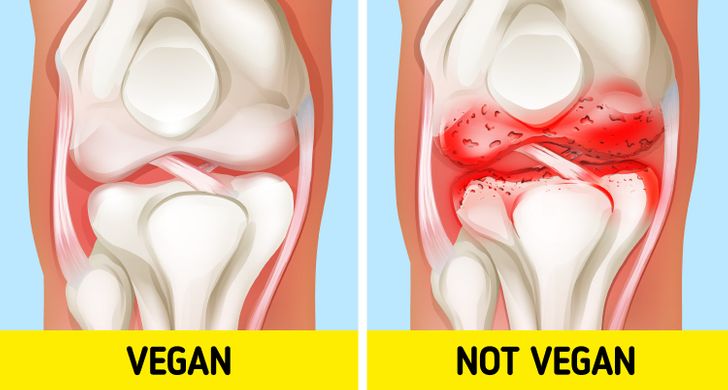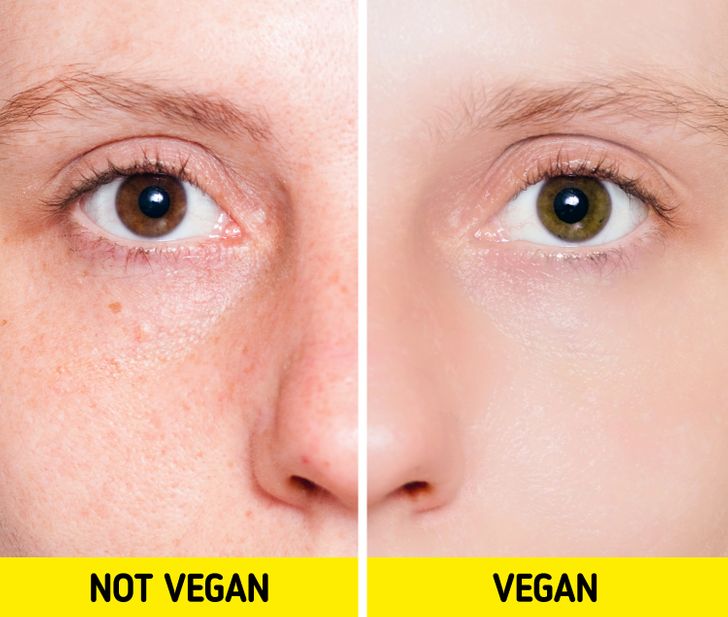Transitioning to a vegan lifestyle can bring about profound changes in your body and overall well-being. Whether you’re considering a plant-based diet for weight loss, enhanced energy, or ethical reasons, understanding the physiological transformations that occur can help motivate you on your journey. In this comprehensive guide, we delve into eight significant changes that many people experience when they go vegan.
By exploring topics such as improved sleep quality, weight loss, hormonal balance, reduced joint inflammation, enhanced taste perception, digestive changes, clearer skin, and altered body odor, we provide a detailed look at how a vegan diet can optimize your health. Credible sources like Harvard Health Publishing and Mayo Clinic support these insights, ensuring that the information you receive is reliable and scientifically grounded.
Improved Sleep Quality – How a Vegan Diet May Help You Sleep Better

One of the most unexpected benefits reported by those who adopt a vegan diet is improved sleep quality. A plant-based diet rich in fruits, vegetables, and whole grains can have a positive impact on your circadian rhythm and overall sleep patterns.
Key Points:
Nutrient-Rich Foods: Vegan diets are typically high in vitamins, minerals, and antioxidants, which can help regulate your sleep cycle. Nutrients like magnesium, found abundantly in leafy greens, play a critical role in maintaining a healthy nervous system.
Reduced Inflammation: Inflammation can interfere with sleep by causing discomfort and restlessness. A vegan diet, with its emphasis on anti-inflammatory foods, can help reduce these symptoms.
Lower Caffeine and Processed Food Intake: Many vegans tend to avoid processed foods and limit caffeine, both of which can contribute to better sleep patterns.
Research highlighted by the National Sleep Foundation suggests that dietary changes can significantly affect sleep quality. As you transition to a vegan diet, the improved nutrient profile may lead to deeper, more restorative sleep.
Weight Loss Benefits – Shedding Pounds with a Plant-Based Diet

Many individuals report weight loss after switching to a vegan diet, which is often attributed to the lower calorie density and higher fiber content of plant-based foods.
Key Points:
Low-Calorie, Nutrient-Dense Foods: Fruits, vegetables, legumes, and whole grains are naturally low in calories but high in essential nutrients. This combination helps you feel full without consuming excessive calories.
High Fiber Intake: Increased fiber consumption aids in digestion, reduces hunger, and helps maintain a stable blood sugar level, contributing to long-term weight management.
Reduced Fat Consumption: A vegan diet typically contains fewer saturated fats compared to a meat-based diet, which can lead to improved heart health and lower body fat levels.
A study published on Healthline supports the claim that a vegan diet can contribute to significant weight loss. By focusing on whole, plant-based foods, you may naturally reduce your caloric intake and improve your body composition over time.
Hormonal Balance – How a Vegan Diet Can Influence Your Hormones

Hormonal balance is crucial for overall health, affecting everything from mood and energy levels to reproductive health. A vegan diet may positively influence hormonal balance due to its high nutrient density and low intake of animal-based hormones and additives.
Key Points:
- Phytoestrogens: Plant-based diets include phytoestrogens, which can help regulate estrogen levels in the body. These naturally occurring compounds are found in foods like soy and flaxseeds.
- Reduced Exposure to Animal Hormones: By avoiding meat and dairy, you reduce your exposure to hormones often present in animal products, which can disrupt your own hormone balance.
- Improved Insulin Sensitivity: A vegan diet rich in whole grains and legumes can improve insulin sensitivity, thus maintaining healthy blood sugar levels and preventing hormonal imbalances related to metabolic syndrome.
For further reading on the impact of diet on hormonal health, check out articles from Mayo Clinic and Harvard Health Publishing. They provide in-depth analysis on how nutritional choices can affect hormonal regulation.
Reduced Joint Inflammation – Easing Pain with Anti-Inflammatory Foods

Joint inflammation and pain are common issues that can greatly affect your quality of life. A vegan diet, high in anti-inflammatory foods, may help alleviate these symptoms by reducing systemic inflammation.
Key Points:
- Rich in Antioxidants: Fruits, vegetables, and whole grains are rich in antioxidants that help combat oxidative stress and reduce inflammation throughout the body.
- Omega-3 Fatty Acids: While traditional sources of omega-3s come from fish, plant-based options like chia seeds, flaxseeds, and walnuts offer beneficial fatty acids that help lower inflammation.
- Elimination of Pro-Inflammatory Foods: By cutting out animal products and processed foods, which are often high in saturated fats and additives, you can reduce the inflammatory burden on your joints.
Studies published on PubMed indicate that diets rich in anti-inflammatory foods can significantly improve joint health and reduce pain symptoms associated with conditions like arthritis.
Enhanced Taste Perception – Rediscovering Flavors on a Vegan Diet

Many people who switch to a vegan diet report an interesting phenomenon: an enhanced sense of taste. As your palate adapts to a variety of natural flavors, you may begin to notice subtleties in food that you never appreciated before.
Key Points:
- Fresh and Natural Foods: A diet focused on fresh fruits, vegetables, and herbs allows your taste buds to experience more vibrant and natural flavors, free from artificial additives and preservatives.
- Culinary Creativity: Embracing a vegan lifestyle often leads to experimenting with spices and herbs, which can enhance the overall flavor profile of your meals.
- Reduced Sensory Overload: The avoidance of highly processed and overly salty or sugary foods can recalibrate your taste buds, making you more sensitive to natural flavors.
For more insights on how diet can influence taste perception, you can refer to Harvard Health Publishing which discusses the interplay between nutrition and sensory experiences.
Digestive Changes and Bloating – Understanding the Transition to a Vegan Diet
Switching to a vegan diet can sometimes lead to digestive changes, including increased bloating, especially during the initial transition period. These changes are typically temporary as your digestive system adapts to higher fiber intake.
Key Points:
- Fiber-Rich Foods: While fiber is essential for a healthy digestive system, a sudden increase in fiber intake can lead to gas and bloating. Gradually incorporating fiber into your diet can help mitigate these effects.
- Gut Microbiome Adaptation: Your gut flora may need time to adjust to a new, plant-based diet. A diverse microbiome can enhance digestion and overall gut health over time.
- Hydration and Probiotics: Drinking plenty of water and incorporating probiotic-rich foods like sauerkraut and kimchi can support your digestive system during the transition.
For additional information on managing digestive changes when adopting a vegan diet, check out resources on Healthline.
Clearer Skin – The Impact of a Plant-Based Diet on Your Complexion

A vegan diet can also lead to clearer, more radiant skin. The high intake of vitamins, minerals, and antioxidants from plant-based foods supports skin health and can reduce the occurrence of acne and other skin issues.
Key Points:
- Antioxidant Power: Foods rich in antioxidants help fight free radicals that can damage skin cells. Berries, leafy greens, and nuts are excellent sources of these protective compounds.
- Reduced Hormonal Fluctuations: A balanced vegan diet can stabilize hormones, which in turn can reduce acne breakouts and other skin blemishes.
- Hydration and Detoxification: With an emphasis on whole, unprocessed foods and high water intake, a vegan diet promotes natural detoxification processes that benefit your skin.
For more detailed information on how diet affects skin health, consider reading articles from Mayo Clinic and Harvard Health Publishing.
Changes in Body Odor – How a Vegan Diet May Alter Your Natural Scent
One of the less talked about but intriguing changes when adopting a vegan diet is a shift in body odor. Many people report that their natural scent becomes less pungent or “stale” after eliminating animal products from their diet.
Key Points:
- Reduced Intake of Animal Fats: Animal products, particularly red meat, contain compounds that can influence body odor. By removing these from your diet, you may notice a fresher scent.
- Increased Consumption of Fresh Produce: The antioxidants and phytonutrients in fruits and vegetables can help neutralize odors and promote a more pleasant natural body odor.
- Enhanced Detoxification: A cleaner, plant-based diet aids the body’s detoxification processes, contributing to overall odor reduction.
Studies and anecdotal evidence suggest that dietary choices can significantly influence body odor. For more scientific insights on this topic, PubMed offers research articles that delve into the relationship between diet and natural scent.
Integrating Vegan Habits for Long-Term Health Benefits
Adopting a vegan lifestyle is more than just a dietary change—it’s a holistic approach to improving your overall health and well-being. The eight changes discussed in this guide illustrate the wide-ranging benefits of a plant-based diet, from enhanced sleep and weight loss to clearer skin and reduced inflammation. By understanding these changes, you can better prepare for the transition and enjoy the positive impacts on your body.
Actionable Strategies:
Gradual Transition: If you’re new to veganism, consider gradually eliminating animal products from your diet rather than making a sudden switch. This can help your body adjust and reduce potential digestive discomfort.
Balanced Nutrition: Ensure your vegan diet is well-rounded by including a variety of fruits, vegetables, whole grains, legumes, and healthy fats. This will provide you with all the necessary nutrients for optimal health.
Monitor Your Progress: Keep track of how your body responds to the vegan diet. Whether it’s improved sleep, weight loss, or changes in skin clarity, monitoring these benefits can help you stay motivated.
Consult Experts: If you have specific health concerns, consider consulting a nutritionist or dietitian who specializes in vegan diets. Trusted resources like Harvard Health Publishing and Mayo Clinic can offer additional guidance.
Conclusion – Embrace the Vegan Journey for a Healthier Future
Making the shift to a vegan diet can be a transformative experience, impacting your health in multiple positive ways. From better sleep and weight loss to hormonal balance and improved skin clarity, the benefits of a plant-based lifestyle are both profound and wide-ranging. Although the transition may come with some temporary challenges, such as digestive adjustments or changes in body odor, the long-term advantages far outweigh these initial hurdles.
By embracing the vegan lifestyle, you not only make a positive impact on your own health but also contribute to environmental sustainability and animal welfare. With a growing body of scientific research and expert endorsements supporting the benefits of veganism, there’s never been a better time to explore the potential of plant-based eating.
Every small change you make towards a vegan diet is a step towards a healthier, more vibrant future. Whether you’re driven by ethical, environmental, or health reasons, the journey to veganism is an investment in your long-term well-being. Embrace the change, stay informed, and enjoy the many benefits that come with a well-balanced, plant-based lifestyle.
For more in-depth information and practical tips, be sure to visit reputable sources like Harvard Health Publishing, Mayo Clinic, and Healthline. Their evidence-based advice can help guide you on your path to improved health through veganism.









Leave a Reply